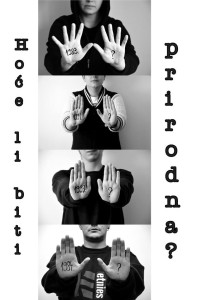
LGBT persons are still subject to stigmatization and discrimination in Bosnia and Herzegovina. Chloé Gaillard speaks with three young Bosnians who agreed to share their personal coming out stories.
On 17 May 1990, the World Health Organization (WHO) removed homosexuality from its International Classification of Diseases. Yet even though most of the member states that makeup the WHO are committed to fighting discrimination based on sexual orientation and gender, some member states remain hesitant to fully implement the necessary measures that guarantee efficient protection, thus creating opportunities for violence and discrimination against the Lesbian, Gay, Bi- and Transsexual (LGBT) community.
Bosnia-Herzegovina is one of those WHO member states in which LGBT persons are still subject to stigmatization and discrimination. This small country of 3.8 million inhabitants is composed of three constituent ethnic groups: 48% Bosniaks, 37.1% Serbs and 14.3% Croats. Since the end of the war in 1995 and the Dayton Peace Agreement, Bosnia has been divided into two entities: the Federation of Bosnia-Herzegovina (FBiH), which contains a Bosniak and Croat majority, and the Republika Srpska (RS), which is primarily inhabited by Bosnian Serbs. In addition to the two entities there is the autonomous Brčko District. Both entities legalized homosexual relationships between 1998 and 2000, making the early 2000s a source of new hope for the LGBT community.
In 2003, a law on gender equality, which prohibits discrimination based on gender and sexual orientation without explicit mention of homosexuality or gender, was adopted at the national level. The adoption of gender equality laws saw the first associations of activists and supporters of LGBT rights begin to emerge in Bosnia, not knowing that this wave of hope was soon to be crushed by violence.
The Queer Sarajevo Festival, one of the first events ever in Bosnia with the aim to increase visibility of the LGBT community, was organized in September 2008. Almost immediately, the choice of the date was highly criticized due to the coinciding Ramadan celebrations. Numerous events were supposed to be held during the five-day festival, however, organizers were forced to cancel the festival at the end of the first day, due to an attack from a group of Wahhabi fundamentalists and hooligans, who assaulted several participants and injured eight people, including policemen.
Since the 2008 attacks, the LGBT community has become almost invisible and all events organized to increase its visibility are subject to threats that often lead to violence. Over time, and despite the progress made in neighboring countries such as Croatia – which recently legalized civil union for same sex couples — the situation in Bosnia has not improved. On 1 February 2014, a group of masked men attacked people attending the Merlinka Festival in the Art Cinema Kriterion in Sarajevo, underscoring the minimal progress made since the violent events in 2008. Even more alarming are surveys from 2013 that revealed that 59.5% of Bosnians consider sex change repulsive and that 56.5% of the respondents believe “homosexuality must be cured.” In light of this survey and the general climate of misunderstanding and violence in Bosnia regarding this issue, a key question arises: Is it possible for people from the LGBT community to live a safe and open life in Bosnia?
Being born in a world where society expects you to be heterosexual, falling out of that “norm” implies that homosexuals must “come out.” As defined in the Pink Report (2014), the concept of “coming out”, derived from the phrase “coming out of the closet”, is routinely used to describe public or open declarations and affirmation of one’s (homo)sexual orientation.
Niki, Selma and Aleks1 are three young Bosnians living in Sarajevo who agreed to share their personal coming out stories.
Niki is a Bosnian LGBT activist and identifies as queer. She realized her identity at an early age and understood when she was 5 years old that she could not see herself “in the man-woman concept.” Growing up, “[she] could cope with the understanding that gender normativity is a social construct and that it is perfectly fine to be outside of the ‘box’.”
“I was 14 when I came out to my parents and I felt pretty lost because it was also a challenge to come out to myself. In the end, it wasn’t a big deal as my parents fully supported me. It was not always easy and I have not always chosen to reveal my sexuality. For instance, when I was involved in working in academia and for private companies I never addressed that ‘issue’ so as to prevent worst case scenarios such as being fired.”
Selma is also an LGBT activist who came out as a lesbian before realizing that she could also be attracted to people “with genders other than male and female”, therefore, she now identifies as pansexual. Being part of a very religious family means coming out is a very difficult step for her to take. “My parents don’t know anything. I’m pretty much “out” in college, and with my friends. When it comes to family I am out to my sister and my cousin. My parents are deeply religious and have both been physically violent towards me. I won’t be coming out to them anytime soon, because I don’t feel that it’s a safe environment… I am tired of leading a double life and I just want to be who I am.”
This feeling of insecurity is dominant within the LGBT community, especially for women. Indeed, violence against lesbians is common in Bosnia and lesbians aged 20 to 30 are the most exposed to discrimination, with 74% of this age group having experienced some form of discrimination. “Transphobia is also a big issue in the country,” explains Aleks, an LGBT activist and leading figure in the trans community in the Balkans. “I have experienced both transphobia and homophobia. I was beaten up many times. There was a lot of verbal and psychological violence related to my gender identity. Unfortunately, it’s hard to choose just one example because there are a lot of them,” Aleks explains. “Coming out as a trans* person differs from other coming out scenarios. A trans person who starts hormonal therapy and undergoes surgery has no choice but to ‘come out’ because physical changes are inevitable.”
Aleks came out as a trans* person when he was 22 years old, requesting that people use the pronoun “he” when referring to him. According to Aleks, coming out is still very much a political act in Bosnia and he believes it is important to declare your sexual orientation. “I personally don’t like labels but it’s extremely important for political reasons and for the visibility of the trans* community. It’s not easy to come out to your family and friends, especially when you live in a very conservative, patriarchal and heteronormative society. There is a lot of violence and hatred towards the LGBT community, so people don’t feel safe and are often afraid of being rejected and kicked out of their home. Coming out is a very important step in the fight for the rights of sexual minorities and in allowing people to finally be themselves.”
Within the context of a deeply patriarchal society lacking political maturity and the will to promote the inclusion of ethnic and other minorities, such as Roma, Jews and disabled people, LGBT issues seem to be on the very margin of socio-political visibility and acceptance. Due to Bosnian society’s repressive mechanisms and institutionalized discrimination — embodied in law, healthcare and education — being “out” in Bosnia can come with several risks at both the personal and social levels.
Nevertheless, LGBT activists in Bosnia are emphasizing the political perspective and importance of coming out in their country, pointing out the fact that it should be considered a political act rather than a personal issue. Unfortunately, there is a long road ahead, given that the country still struggles with basic post-conflict issues such as poverty, ethnonationalism and corruption. Although Bosnian LGBT people and activists may be making themselves vulnerable to violence by affirming their identity, their bravery is helping the community to become more visible while encouraging others to come out and to join the battle against discrimination.
1 Names have been changed.






